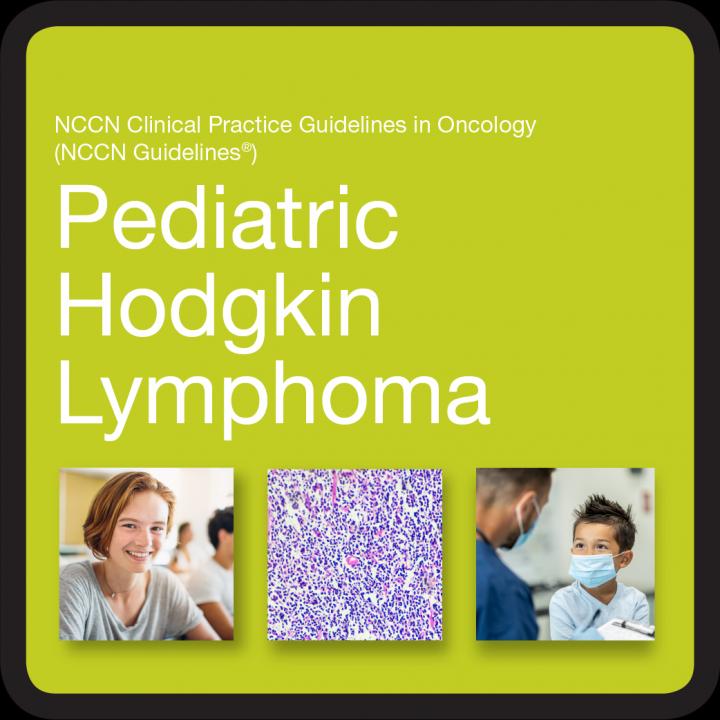The National Comprehensive Cancer Network publishes free treatment recommendations for pediatric Hodgkin lymphoma, adding to growing library of pediatric cancer guidelines

Credit: NCCN
PLYMOUTH MEETING, PA [September 28, 2020] — The National Comprehensive Cancer Network® (NCCN®) today announced the publication of new NCCN Clinical Practice Guidelines in Oncology (NCCN Guidelines®) for Pediatric Hodgkin Lymphoma. Hodgkin lymphoma is one of the most curable forms of pediatric cancer, with long-term survival rates of 90% or higher . However, treatment can result in potentially life-threatening or -altering long-term side effects. These new recommendations from NCCN synthesize the latest evidence and expert-consensus to make sure every child receives appropriate, but not excessive, treatment.
“There has never been a more important time for these NCCN Guidelines than during this pandemic, when many patients need to be treated at their local institutions–even when a trial is available–due to travel and caregiver limitations,” said Jamie Flerlage, MD, MS, St. Jude Children’s Research Hospital, Chair, NCCN Guidelines Panel for Pediatric Hodgkin Lymphoma. “There are many treatment options to choose from for pediatric Hodgkin lymphoma; some are better than others depending on the patient’s stage and risk group. These guidelines have information to help providers weigh the benefits and potential setbacks of various options for treating each individual. We’ll continue to update these guidelines regularly and incorporate any important new data from ongoing clinical trials.”
“With so many treatment options available, it’s crucial to present all the evidence that can guide providers to the best choices for their patients,” said Susan Hiniker, MD, Assistant Professor, Radiation Oncology, Stanford Cancer Institute, Vice-Chair, NCCN Guidelines Panel for Pediatric Hodgkin Lymphoma. “It can be a challenge for individual practitioners to follow and interpret all the clinical trial data. The NCCN multidisciplinary panel of experts deliberated and debated carefully to be sure we’re sharing optimal approaches that are firmly rooted in evidence.”
Hodgkin lymphoma accounts for approximately 6% of all childhood cancer diagnoses in the United States, with just over 1,000 people diagnosed under the age of 20 every year. Nearly half of all people diagnosed with Hodgkin lymphoma in the U.S. are 35 or younger.
“The treatment approaches for children with Hodgkin lymphoma are very different than for adults, so we really needed a separate set of guidelines for this population,” said Kara Kelly, MD, Division Chief, Pediatric Hematology/Oncology, Chair of Pediatrics at Roswell Park Comprehensive Cancer Center, Chief of the Roswell Park Oishei Children’s Cancer and Blood Disorders Program, and Member, NCCN Guidelines Panel for Pediatric Hodgkin Lymphoma. “Pediatric patients have fewer competing health concerns and may tolerate higher doses, which lowers their risk of relapse. These guidelines really focus on how to strike the right balance for disease control while reducing long-term effects from the treatment.”
NCCN has been providing gold standard recommendations for clinical direction and policy in cancer management for 25 years with a proven track record for improving outcomes while reducing costs. NCCN Guidelines are available free-of-charge for non-commercial use at NCCN.org or via the Virtual Library of NCCN Guidelines® App.
The organization began providing recommendations for managing childhood cancers with the NCCN Guidelines for Pediatric Acute Lymphoblastic Leukemia (ALL), which launched in May 2019. Since then, those guidelines have been translated into multiple languages, and harmonized for lower-resource settings in sub-Saharan Africa–as part of the group Allied Against Cancer working in collaboration with the African Cancer Coalition (ACC), American Cancer Society (ACS), the Clinton Health Access Initiative (CHAI), and IBM. They have also been re-written in non-medical terms as NCCN Guidelines for Patients: Pediatric ALL in order to empower parents and guardians as well as patients.
NCCN has subsequently published NCCN Guidelines for Pediatric Aggressive Mature B-Cell Lymphomas. Additional new guidelines for children with Wilms tumors and central nervous system cancers are coming soon.
“Our mission to improve and facilitate quality, effective, efficient, and accessible cancer care so patients can live better lives is never more pressing than it is with young people who have many years ahead of them,” said Robert W. Carlson, MD, Chief Executive Officer, NCCN.
###
About the National Comprehensive Cancer Network
The National Comprehensive Cancer Network® (NCCN®) is a not-for-profit alliance of leading cancer centers devoted to patient care, research, and education. NCCN is dedicated to improving and facilitating quality, effective, efficient, and accessible cancer care so patients can live better lives. The NCCN Clinical Practice Guidelines in Oncology (NCCN Guidelines®) provide transparent, evidence-based, expert consensus recommendations for cancer treatment, prevention, and supportive services; they are the recognized standard for clinical direction and policy in cancer management and the most thorough and frequently-updated clinical practice guidelines available in any area of medicine. The NCCN Guidelines for Patients® provide expert cancer treatment information to inform and empower patients and caregivers, through support from the NCCN Foundation®. NCCN also advances continuing education, global initiatives, policy, and research collaboration and publication in oncology. Visit NCCN.org for more information and follow NCCN on Facebook @NCCNorg, Instagram @NCCNorg, and Twitter @NCCN.
Media Contact
Rachel Darwin
[email protected]
Original Source
https:/




